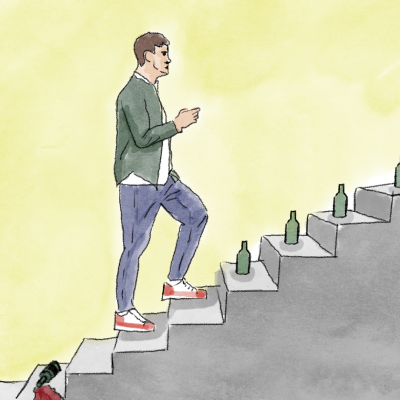
4.3 How to detect alcohol misuse in someone with schizophrenia?
Recognizing alcohol misuse in someone who has schizophrenia can be challenging, as the symptoms of both conditions may overlap.

4.3 How to detect alcohol misuse in someone with schizophrenia?
Recognizing alcohol misuse in someone who has schizophrenia can be challenging, as the symptoms of both conditions may overlap.
For example, isolation, disorganized thinking, and changeable behavior can be symptoms of both schizophrenia and alcohol misuse.
However, being aware of the specific behavioral changes, physical symptoms, and subtle signs that indicate alcohol misuse can help families identify problems early and take necessary action.
Early recognition allows for timely intervention, improving overall treatment outcomes and wellbeing.
Specific indicators that can help distinguish alcoholrelated issues:
Changes in behavior, such as increased secrecy, neglect of responsibilities, or a noticeable decline in personal hygiene.
Physical signs, like the smell of alcohol, unclear speech, or unsteady gait may also be apparent.
Another red flag is a sudden increase in the consumption of alcohol or frequent intoxication, especially in situations where the individual previously did not drink heavily.
Monitoring how alcohol use affects their mental health symptoms –
If there is a noticeable worsening of hallucinations, delusions, or mood instability following alcohol consumption, this could indicate a harmful relationship with alcohol.
It’s also important to consider the impact on their treatment –
If they are missing medications, avoiding therapy, or becoming more isolated, these could be signs that alcohol misuse is interfering with their recovery.
What is alcohol-induced psychotic disorder?
Alcohol-induced psychotic disorder is considered a separate condition from schizophrenia.
It can also be distinguished from other alcohol-related disorders, like alcohol withdrawal delirium.
About 1/3 of people with alcohol dependence who experience psychotic symptoms are diagnosed with alcoholinduced psychotic disorder.
Several theories attempt to explain how alcohol-induced psychotic disorder may develop. It might arise as:
• a way of self-medicating schizophrenia symptoms,
• a direct result of excessive alcohol use,
• a separate but concurrent condition.
Alcohol and violence in people with schizophrenia
Understanding the link between alcohol use, schizophrenia, and violent behavior is key to effective support.
Research shows that a history of violent incidents is a major predictor of developing an alcohol use disorder (AUD) after a schizophrenia diagnosis.
This underscores the importance of closely monitoring both alcohol consumption and any history of violence.
Being proactive about these issues can greatly enhance your loved one’s treatment and overall well-being.
Do men and women experience alcohol differently?
Men and women react differently to alcohol, and these differences are rooted in biology.
Women tend to become intoxicated after consuming smaller amounts of alcohol compared to men.
This discrepancy may be attributed to the fact that women typically have less total body water than men of similar size, resulting in higher bloodalcohol concentrations following equivalent alcohol consumption.
Additionally, women possess a lower concentration of gastric alcohol dehydrogenase, which breaks down alcohol in the stomach, compared to men.